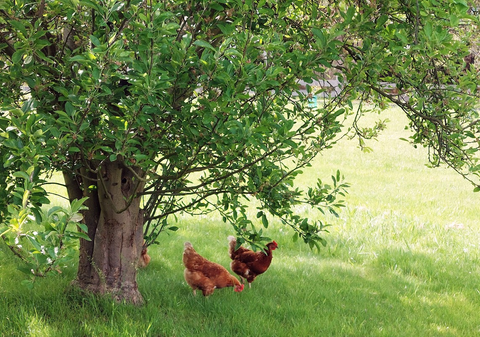Backyard chicken keeping is a rewarding hobby that provides fresh, nutritious eggs for your family. However, it can be frustrating when you aren’t receiving the eggs that you expect. Your hens may suddenly stop laying or slow down their egg laying. For these reasons, it’s not uncommon for our customers to start wondering just how often do chickens lay eggs?
This post is based on one of our live, on-farm presentations which took place pre-COVID times on Sunday the 10th of June 2018 (here’s the Video). We continue to provide on-farm presentations on a range of topics relevant to keeping backyard chickens. In this post, we'll explore the most common reasons behind egg-laying issues and provide practical solutions to get your hens back on track.
Before Getting Started
Before bringing home your backyard chickens, consider your goals. Do you want a consistent supply of eggs throughout the year or are you content with a seasonal break? Your answer will guide your choice of hen breed as some are more prone to laying interruptions than others.
Understanding "How Often Do Chickens Lay Eggs?"
On average, a healthy, young hen will lay an egg every 24 to 36 hours during her prime laying years which is normally her first laying season. However, this frequency can vary depending on a number of different factors, including breed, age, season, diet, environment and overall health.
Key Factors Affecting Egg Production
1. Breed of Chicken
Purebred hens such as the Australorp, Silkie and Sussex, often stop laying during autumn or winter due to a natural process called "moulting". During this time, hens shed feathers and divert energy away from egg production. If year-round laying is your priority, consider hybrid breeds such as the Hy-Line, Lohmann or ISA Brown, which have been bred to minimise seasonal laying interruptions. You can learn more about moulting in our recent article titled Moulting Chickens - Why and How to Help.
Another trait common in purebred hens is broodiness, where they stop laying and focus on sitting on eggs to incubate and hatch them. This tendency varies by breed and has largely been bred out of hybrid hens although it does still happen from time to time in warmer weather. When considering the question "How often do chickens lay eggs?" it's important to factor in the breed-specific traits that can affect laying frequency.
2. Seasonal Influences
Shorter days in winter mean reduced eating time for chickens, leading to fewer eggs. Commercial egg farms use artificial lighting to maintain a consistent 16-hour day, regardless of season. Extreme temperatures also affect egg production as hens eat less in hot weather and require more energy to regulate their body temperature in cold conditions.
To mitigate seasonal effects, consider insulating your coop and relocating it to shaded areas in summer or sunny spots in winter. The less variable the temperature inside your chicken coop, the higher the comfort levels for your flock which will help your hens maintain a more consistent laying schedule.
3. Age of Hen
Hens older than 18 months of age tend to lay eggs less frequently and with lower quality. As hens age, their ability to produce calcium for egg shells doesn’t keep pace with the increase in egg size resulting in thinner more easily broken shells.
To ensure a steady egg supply in a range of egg sizes, introduce young hens around the point of lay age (18-22 weeks old), to your flock every year or so. There will be a new pecking order to be established but when integrated correctly, they will normally settle-down within a week or two.
For older hens, provide supplemental calcium through peck blocks such as our Harden-Up, Vitamin D, or coarse shell grit in a separate feeder. By managing your flock's age and providing the necessary nutrients, you can maintain a more consistent flow of high-quality eggs from your chicken coop.
4. Diet and Feed Quality
High-quality feed is crucial for getting the very best out of your hens whether purebred or hybrid. Investing in a premium, well-balanced diet will lead to earlier laying, longer laying periods and larger, better quality and more consistent eggs.
A completely balanced "mash" feed (coarse mix of specific ingredients), promotes a healthy and efficient gut, while "pelletised" feed may not provide the same gut stimulation. The biggest problem we find with pelletised feeds is the low protein levels of the common, cheaper brands and the bland taste of pellets for hens. The biggest problem with a mash feed is “cherry picking” behaviour so we always recommend that owners let their feeder run-out before refilling it.
Excessive or low-grade scraps can also reduce egg quantity and quality, especially for hybrid hens that are less accustomed to foraging or eating scraps when compared to most purebreds. When addressing the question, "How often do chickens lay eggs?" it's essential to consider the role of nutrition in maintaining a consistent laying schedule as it is one of the most vital components.
5. Illness and Parasites
Intestinal worms can significantly impact egg laying and hen health by diverting nutrition away from egg laying, feather growth and maintaining good physical condition. Signs of worm issues include soft, rough, malformed, white or pointy egg shells and reduced egg output.
To effectively treat internal parasitic worms, use a dewormer that is registered in Australia for laying hens such as Piperazine, Levamisole or Fenbendizole. Some products target just the most common poultry worms (roundworms), while others are broader and target a number of less common worms (threadworms, tapeworms, hookworms etc).
It’s always a good idea to treat all flock members at the same time and not just the hen(s), with egg quality issues. Always treat hens twice around 10 days apart as the eggs that parasites lay are difficult to destroy so we have to wait until they hatch in order to kill them. Always sweeten the medicated drinking water in all water-based dewormers as hens typically find the taste very bitter. Feed-based dewormers are more holistic products than the water-based and are mixed into the feed that the flock is already eating. An example is and Worm All which is a broader-spectrum dewormer that doesn't require a follow-up dose like other dewormers.
Illnesses and diseases can also cause hens to redirect energy away from egg-laying and into fighting off the infection. Support your hens during this challenging time with supplements like Vitality Booster or Mother Hen's Remedy. By promptly addressing health concerns, you can minimise the impact on egg production which can often be the first thing to suffer when hens become unwell.
6. Environmental Factors
Predators, loud noises and other stressors can scare hens, causing them to stop laying for up to 5 days. Ensure your coop is secure and check regularly for signs of digging, attempted entry or predator droppings.
As mentioned previously, introducing new hens will disrupt the pecking order and any persistent bullying behaviour can affect egg laying from bullied hens. Manage this by providing peck blocks and separate if possible along with extra food and water sources, introducing new hens gradually and separating bullies or bullied hens if necessary. A stable, stress-free environment is key to maintaining a consistent laying schedule.
7. Light Exposure
Hens require a minimum of 14 hours of light per day to maintain consistent egg production. As the days get shorter in the autumn and winter, egg laying may decrease or stop altogether. To combat this, you can install artificial lighting in your coop to extend the daylight hours and stimulate more consistent egg production over this time.
When using artificial lighting, it's essential to introduce it gradually and maintain a consistent schedule. Abrupt changes in lighting can stress your hens and disrupt their laying cycle.
8. Moulting
Moulting is a natural process in chickens that occurs annually, typically in autumn, when hens shed their old feathers and grow new ones. During this time, which can last anywhere from 4 to 16 weeks, hens will stop laying eggs as their bodies focus on feather regeneration.
While moulting is a normal part of a hen's life cycle, it can be influenced by factors such as age, breed, overall health and nutrition. Older hens may moult more frequently or for longer periods, while hybrid breeds may have shorter, less noticeable moults. Many hybrid hens lose feathers around their neck, breast and bottom areas yet continue to lay eggs. To support your hens during moulting, provide a high-protein diet and minimise stress in their environment.
Owning chickens is not only about having an interesting and fun pet but also about providing your family with versatile, delicious and highly nutritious food. To ensure a consistent supply of high-quality eggs, it’s best to start with hybrid laying hens and provide them with a premium, well-balanced diet. By investing in high-quality nutrition it will pay-off over the long-term with exceptional eggs from your backyard flock.
By understanding the factors that influence egg production and taking proactive steps to address them, you can reduce laying interruptions and enjoy the many rewards of backyard chicken keeping. When you're asked, "How often do chickens lay eggs?" you can confidently answer that with right breed, feed, and proper care and management, your hens provide a consistent daily supply of fresh eggs for your family to enjoy.







Comments (2)
Thank you so much for your help
good thanks -can I introduce new 22 day layers in with the old hens or will they batter them?